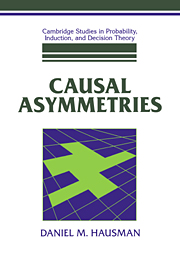Book contents
- Frontmatter
- Contents
- List of Figures
- Acknowledgments
- Introduction: Causation and its Asymmetries
- 1 Metaphysical Pictures and Wishes
- 1* Transfer Theories
- 2 Is Causation a Relation Among Events?
- 3 Causation, Regularities, and Time: Hume's Theory
- 4 Causation and Independence
- 4* Causation, Independence, and Causal Connection
- 5 Agency Theory
- 5* Causal Generalizations and Agency
- 6 The Counterfactual Theory
- 6* Independence and Counterfactual Dependence
- 7 Counterfactuals, Agency, and Independence
- 7* Agency, Counterfactuals, and Independence
- 8 Causation, Explanation, and Laws
- 8* Causation, Explanation, and Independent Alterability
- 9 Probabilistic Causation
- 10 Causation and Conditional Probabilities
- 10* Causal Graphs and Conditional Probabilistic Dependencies
- 11 Intervention, Robustness, and Probabilistic Dependence
- 11* Interventions and Conditional Probabilities
- 12 Operationalizing and Revising the Independence Theory
- 12* Probability Distributions and Causation
- 13 Complications and Conclusions
- Appendix A Alphabetical List of Propositions
- Appendix B List of Theorems
- References
- Index
12 - Operationalizing and Revising the Independence Theory
Published online by Cambridge University Press: 20 April 2010
- Frontmatter
- Contents
- List of Figures
- Acknowledgments
- Introduction: Causation and its Asymmetries
- 1 Metaphysical Pictures and Wishes
- 1* Transfer Theories
- 2 Is Causation a Relation Among Events?
- 3 Causation, Regularities, and Time: Hume's Theory
- 4 Causation and Independence
- 4* Causation, Independence, and Causal Connection
- 5 Agency Theory
- 5* Causal Generalizations and Agency
- 6 The Counterfactual Theory
- 6* Independence and Counterfactual Dependence
- 7 Counterfactuals, Agency, and Independence
- 7* Agency, Counterfactuals, and Independence
- 8 Causation, Explanation, and Laws
- 8* Causation, Explanation, and Independent Alterability
- 9 Probabilistic Causation
- 10 Causation and Conditional Probabilities
- 10* Causal Graphs and Conditional Probabilistic Dependencies
- 11 Intervention, Robustness, and Probabilistic Dependence
- 11* Interventions and Conditional Probabilities
- 12 Operationalizing and Revising the Independence Theory
- 12* Probability Distributions and Causation
- 13 Complications and Conclusions
- Appendix A Alphabetical List of Propositions
- Appendix B List of Theorems
- References
- Index
Summary
The operationalizing assumption (OA) linking causal connections and probabilistic dependencies appears to be false – probabilistic dependencies seem to be neither sufficient nor necessary for nomic connections. In chapter 4,1 urged the reader instead to regard OA as a useful approximation. But perhaps appearances are misleading. Is it truly impossible to reduce claims about causation to claims about probabilistic dependencies? Chapter 11 suggested that a reduction may be possible within the context of path models. Could OA and the independence theory provide a reductive account of causation? And if they cannot, just how closely linked are lawful connections and probabilistic dependencies? To what extent can the independence theory of causation be made operational?
Do Probabilistic Dependencies Imply Causal Connections?
There seem to be cases in which a is not causally connected to b – that is, that there is no nomological link between a and b – even though a and b are distinct events and in the background circumstances the kinds a and b are probabilistically dependent. This section will be concerned with three difficulties for the claim that probabilistic dependencies are sufficient for causal connections.
The first concerns “spurious” probabilistic dependencies, like those between water levels in Venice and bread prices in England. Papineau has argued that “correlations between the stages of different time series are not to be counted as causally significant unless they display co-variation beyond that due to co-variation within each time series” (1993, p. 243).
- Type
- Chapter
- Information
- Causal Asymmetries , pp. 239 - 254Publisher: Cambridge University PressPrint publication year: 1998



